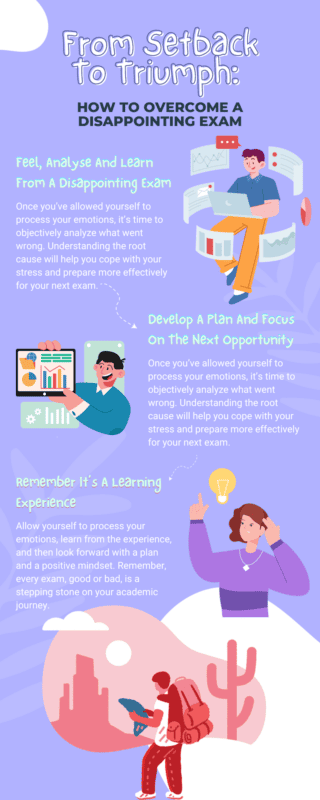Experiencing a disappointing exam is an almost universal part of the educational journey. For students, exams often carry a significant weight – they are not just assessments of learning but are also perceived as milestones that can shape academic and career trajectories. This pressure can make the experience of a bad exam particularly distressing, leading to a cascade of negative emotions and thoughts. The aftermath of such an experience can be a critical time for self-reflection and strategy development, not only for academic success but also for personal growth and resilience.
Understanding that exams, while important, are just one aspect of the learning process is crucial. They are snapshots of performance at a particular moment and under specific conditions, and they don’t always accurately reflect a student’s true abilities or potential. Hence, it’s essential to develop strategies to cope with and learn from these experiences. In this article, we will explore practical and emotional strategies to help you navigate through the aftermath of a bad exam. These tips are designed to empower you to turn a setback into a setup for a comeback, ensuring that you emerge from the experience stronger and more prepared for future challenges!
Feel, Analyse and Learn from a Disappointing Exam
It’s natural to feel upset after a disappointing exam. Permit yourself to experience these emotions. Whether it’s crying, venting to a friend, or expressing your feelings through writing or art, releasing these emotions is a crucial step towards healing. Suppressing them can lead to increased stress and may negatively impact your future performance.
Once you’ve allowed yourself to process your emotions, it’s time to objectively analyze what went wrong. Was it a lack of understanding of the topic, poor time management, or other external factors? Understanding the root cause will help you cope with your stress and prepare more effectively for your next exam.
Develop a Plan and Focus on the Next Opportunity
Based on your analysis, create a plan of action for your next exam. This may include modifying your study habits, seeking additional help (Don’t hesitate to seek support from teachers, family, or friends!), or managing your time more efficiently. Planning a study plan or setting specific, achievable goals will help keep you focused and motivated.
Most importantly, dwelling on a bad exam won’t change the outcome. Shift your focus to the next opportunity. Whether it’s another exam or a different academic challenge, looking forward provides a sense of purpose and direction.

Remember It’s a Learning Experience
Every setback is a learning opportunity. Reflect on what this experience has taught you, not just academically, but also about resilience and coping with challenges. And as you prepare for the next exam, celebrate small victories along the way. This will boost your confidence and keep you motivated!
In conclusion, facing a bad exam can be a challenging experience, but it’s important to remember that it’s not definitive of your abilities or potential. The steps we’ve discussed are not just strategies; they are a testament to the resilience and adaptability that lie within each student. Allow yourself to process your emotions, learn from the experience, and then look forward with a plan and a positive mindset. Remember, every exam, good or bad, is a stepping stone on your academic journey. It’s not just about the grades you earn, but the lessons you learn and the person you become in the process. Stay curious, stay motivated, and above all, stay kind to yourself. Here’s to turning challenges into opportunities and continuing to grow, one exam at a time.
Wishing you all the best in your future endeavours!
This article serves solely as advice and should not be considered a replacement for professional guidance. While these suggestions can be beneficial for many, individual experiences and needs may vary. If you or someone you know is struggling with severe anxiety or other mental health issues, it’s crucial to seek help from professional therapists or counsellors. They can provide specialized assistance tailored to individual needs.





